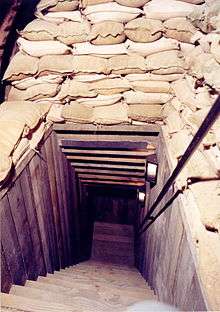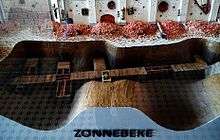Memorial Museum Passchendaele 1917


The Memorial Museum Passchendaele 1917 in Zonnebeke is a Belgian museum devoted to the 1917 Battle of Passchendaele (also known as the Third Battle of Ypres), where in 1917 in only 100 days, almost 500,000 men were killed for only eight kilometers gain of ground. The museum is housed in the historic château grounds of Zonnebeke and focuses on the material aspects of World War I.[1]
History
The history of the Memorial Museum Passchendaele (MMP1917) starts in 1987. For the first time in history there was an exhibition about the Third Battle in Ypres (1917), this exhibition consisted of never shown visual materials from the Imperial War Museum. It was a very big success, with 9000 visitors and a big ceremony on Tyne Cot Cemetery and battlefield tours.
Because of this big success it was decided to put the château at the museum's disposal, with attention fixed on the war years but also the Zonnebeke Augustinian Abbey and local history. The museum opened in 1989.
In 2002 it was decided to renew the museum. The museum gets 3 storeys and becomes a classic historical museum and a reconstructed dug-out is built. The renewed museum opened on Anzac Day 2004.
In 2007, during the commemoration of 90 years of the 'Third Battle of Ypres', the MMP1917 organised six thematic exhibitions who took place on different locations. There are also three trails created.
In 2013 the restoration of the former vicarage is completed to be used as 'Kenniscentrum'.
Theme: The Third Battle of Ypres
The main theme of the museum is the Third Battle of Ypres, also known as the Battle of Passchendaele. This was a major battle in 1917 during the First World War which was fought out by the British, Anzac and Canadian troops and the German army. The total loss of human lives is about 450 000, for only 8 km gain of ground. With this battle the main goal was reached to eliminate an important part of the German Army.
Location
The historic château of Zonnebeke is the ideal departure area for an expedition around the battlefields of 1917. It is within less than 3 km from Polygon Wood and Tyne Cot Cemetery, the biggest cemetery of the Commonwealth.
Next to the reception desk of the museum you can find the visitors' lounge with information on Zonnebeke.
The track
The track of the museum is about 600 meters and is situated in the château grounds of Zonnebeke. There are 5 categories, every part of the museum treats a different category. Everything is stored in the museum and there's also a garden in open air. In this museum there's a true imitation of the dugout and the trenches are also part of the museum.
The collection
The collection from the MMP1917 is rather dynamic. The head collection consists of militaria and many personal objects and documents.
- The old collection (obtained between 1989 and 2002)
- The Hill 60 collection
- The Vieux Berquin collection
- The Fierens collection
- The personal collection
Knowledge Centre
In April 2014 the new knowledge centre Passchendaele opened. In the former vicarage of Zonnebeke there are documentary collections of the MMP1917 and the Zonnebeekse Heemvrienden. Next to the maintenance and the supervision of the documentary collection there is also scientific research done. Downstairs in the building is a reading room, for about 20 researchers.
Projects and events
The museum has an extensive calendar full of events and activities linked to World War I in the neighbourhood.
References
- ↑ "Summary: memorial museum passchendaele 1917". Retrieved 12 June 2015.